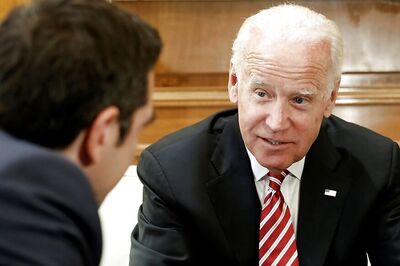
views
The government has already announced that the 5G network is now in its final phases of development, indicating that the rollout in India is on track.
Earlier this year the Union Minister for Electronics and IT, Ashwini Vaishnaw have already said that as the 5G network is already in its final stage of development, the country is now involved in the development of 6G standards.
But as it is expected that the 5G will be rolled out in 2022 and metros as well as big cities would be the first places for launch, it is now important to know what top telcos are doing.
5G Strategy
The fifth-generation or 5G of long-term evolution mobile broadband networks is the most recent upgrade. 5G primarily operates across three bands: low, mid, and high-frequency spectrums, each with its own set of benefits and drawbacks.
While the low-band spectrum has shown significant potential in terms of internet and data exchange coverage and speed, the maximum speed is just 100 Mbps. It means that, while telcos can use and install it for commercial mobile users who don’t have high-speed internet needs, the low-band spectrum may not be ideal for the industry’s specialised needs.
The high-band spectrum has the fastest speed of all three bands, but it also has the smallest coverage and signals penetration strength. Internet speeds in the 5G high-band spectrum have been tested to reach 20 Gbps, whereas the maximum internet data speed in 4G has been recorded at 1 Gbps in most cases.
Revenue from 5G services is expected to rise at a CAGR of 164% over the next five years, contributing up to 1% of global GDP or $1.3 trillion in revenue by 2030.
The Telecom Regulatory Authority of India (TRAI) is likely to release its recommendations on the auction of 5G spectrum soon.
In the face of approaching 5G commercial rollouts, TRAI has also launched a pilot programme to use street furniture to hasten the deployment of telecom infrastructure. The Kandla Port in Gujarat, the Indira Gandhi International Airport in Delhi, the Bengaluru Metro Rail Corporation, and Bhopal city are among the four areas where the regulator is conducting pilot testing.
However, the launch in India though is likely to get delayed beyond the May 2022 timeline, due to challenges brought by the ongoing Russia-Ukraine war.
Here is what the top telcos are doing:
Airtel: Tech Mahindra and Bharati Airtel recently revealed that they have formed a strategic alliance to create and market enterprise-grade digital solutions spanning 5G, private networks and the cloud.
In India, telecom operator Airtel has been demonstrating and testing 5G, while IT services company Tech Mahindra has built 5G applications and platforms. Both the companies stated that together they will co-develop and market 5G use cases in India.
Additionally, Airtel said that it is in advanced talks with new and traditional telecom gear suppliers to negotiate 5G contracts and that it is concentrating on building a “full ecosystem” around OpenRAN, which it claims will make up a large chunk of its planned high-speed network.
However, recently its Chief Technical Officer (CTO) stated that the company will launch its 5G services in India around 2-3 months after the spectrum auctions are concluded.
Reliance Jio: The telecom giant reportedly is in advanced talks with the South Korean consumer electronics and telecom equipment producer Samsung to become its third-party technology supplier, complementing Reliance Jio’s ambitions to put out a 5G network across the country.
It is worth noting that Samsung helped Reliance Jio, with its 4G deployment across the country.
Earlier this year Mukesh Ambani, Chairman of Reliance Industries, announced that Reliance Jio’s 5G network has attained data speeds of 1 Gbps. He informed the 44th annual general meeting (AGM) that the telecom service provider had recently secured necessary regulatory clearances as well as trial spectrum for 5G field trials.
“To develop the end-to-end 5G ecosystem, we are now working with leading global partners to develop a full range of 5G capable devices. The Jio technology is well-positioned to create compelling applications for the consumers and enterprises spanning healthcare, education, entertainment, retail and other key verticals of the economy,” he added.
Prior to that Sundar Pichai, the CEO of Google and Alphabet had joined the AGM digitally to announce that Reliance Jio and Google Cloud will collaborate on 5G. Reliance would shift its main retail business to Google Cloud’s infrastructure as part of this partnership, he added.
However, recently Mathew Oommen, the president of Reliance Jio, has stated that the company is open to using “third-party technology” other than its own for its 5G networks, indicating a possible shift in the company’s position, which had previously stated that it planned to use only its own technology for the next generation networks.
Vodafone Idea: The telco has announced earlier this year a 5G partnership with Ciena, a company based in the United States. In order to prepare for the 5G deployment, Vodafone Idea Limited stated that it is redesigning its backbone scalability and service resiliency with the support of American telecoms networking equipment provider Ciena.
The company has formed alliances with a number of technology companies, ecosystem participants and Indian start-ups in order to develop a number of 5G use cases that are relevant to Indian businesses and consumers.
The company stated that its partnership with Ciena is in keeping with the service provider’s plan to construct a future-ready network for upcoming technologies like 5G in order to propel India’s digital growth.
Additionally, Arvind Nevatia, Chief Enterprise Business Officer, Vodafone Idea recently announced: “We are excited to partner with L&T Smart World & Communication to build a complete solution for Private LTE with cutting-edge applications on future-ready 5G network infrastructure, based on technology expertise from Nokia.”
Read all the Latest Tech News and Breaking News here

















Comments
0 comment